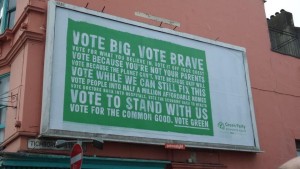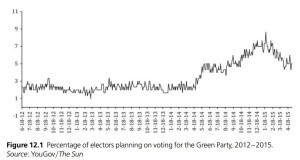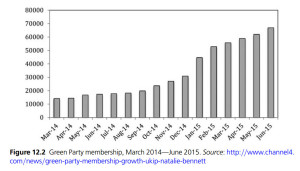Ignored, insurgent, and back again – the first study of the Green Surge

The ‘Green Surge’ may seem like a distant memory to many Greens now, four months after the General Election. The unexpected rise of the Corbyn campaign – adding 400,000 members and supporters to Labour’s ranks – has been a much larger shift in sheer numbers. Yet the first study of the Green surge makes for fascinating reading.
‘The Other Insurgency? The Greens and the Election’ was published in Britain Votes (2015) – arguably the most interesting academic collection on the election out yet – just last week. I’d go as far to say it should be compulsory for staffers and representatives to look through.
There are some absolutely crucial findings worth pondering – some more obvious than others, what I’ll focus on here is where the study puts the surge into perspective.
The crux of it is that ‘more so than for any other party, media portrayal of the Greens contributed to their notable rise and partial fall’. The Green surge was, in large part, a product of a hungry media and a 24 hour news cycle in an age of disillusionment.
Discovery, scrutiny and decline – how the surge happened
The phenomenon followed a pattern which leading political scientists Sides and Vavreck have termed ‘discovery, scrutiny and decline’.
The trigger for ‘discovery’ is usually an event or statement that pricks people’s ears up. In this case, it was the exclusion of the Greens from the General Election debates in May 2014.
Not long after the announcement by David Cameron that the Greens weren’t to be taking part in the debates (and the subsequent sense of anger that ensued), ‘the number of voters intending to vote Green quickly swelled to 5%’. This provided a further boost and caught the media’s attention. The European elections provided a third spurt. The following ‘unprecedented media coverage’ led to a ‘UKIP of the Left’ narrative emerging – to the party’s benefit.
Next came the positioning as a proper left-wing party. 2014 Spring Conference saw Bennett and Lucas both focus on anti-austerity politics in their speeches instead of the environment. This emphasis on social justice was a big draw at a time when Labour were pandering to the cuts agenda.
Meanwhile anger over the Greens’ TV debate exclusion grew, with a massive petition and 80% of the public backing the party’s involvement. The media began to adopt the ‘Green surge’ label, adding fuel to an already well-stocked fire. This largely positive coverage coincided with a poll rise to almost 10% – compared to just a couple of percent a few months previously.
Then, though, the bubble began to burst: the ‘scrutiny’ phase kicked in. Late January until late march saw a sea-change in the tone of the media. Pretty soon the ‘completely bonkers’, ‘loony left’ headlines were flying. The catalyst was Bennett’s notorious Daily Politics interview with Andrew Neil…and then the LBC interview on housing policy a month later.
Poll ratings declined, the media moved on. Green policies were cast as ill-conceived, Bennett as incompetent. Essentially, the story was over – as the SNP became the talk of the nation. ‘Even the set piece election debates…failed to raise much interest in the Green Party’, outside of links with the SNP in a ‘Progressive Alliance’.
The Greens were useful to the media as a UKIP-like insurgent party. The SNP then became the main insurgents once the media got bored of us.
But there’s an upside. Although poll ratings declined to the 4% achieved on election day, the ‘Green surge’ led to a quadrupling of membership in a year – from under 15,000 to well over 60,000. That is something which won’t be lost quickly – unless Corbyn manages to pinch them all.
Key to the Greens’ success, though, was carving ourselves a ‘niche’ as the left-wing party. With Corbyn in the reigns of Labour, this niche might not be so available anymore.
So the question becomes, outside of an election, how do we retain members from the surge, and how do we offer an inspiring vision separate to the Corbynistas’ to enable a new ‘discovery’ of the party?
That, perhaps, is a discussion for next week, when I’ll look at the report’s findings on who the ‘Green surgers’ actually are – and how they differ from ‘Old Greens’. Then things start to get really interesting…





‘Discovery, Scrutiny and Decline’ could be equally well described as ‘Set ’em up and knock ’em down’ a familiar narrative to the British media.
Well done for drawing more attention to this study, another useful contribution to our research base. I met with the author last week for a very interesting conversation, which threw up a few areas that he underplayed in the paper, including (as you mention) the furore over the TV debates.
I don’t understand, though, how you conclude that “key to the Greens’ success… was carving ourselves a ‘niche’ as the left-wing party.” Where in his paper does he say this?
Dennison’s paper is a good deal more sophisticated, noting among other things that our voters identified as broadly left-wing, though no more so than Labour voters. He also suggests – repeating findings from numerous previous research projects – that ‘new politics’ or ‘new left’ issues are far more salient for our voters than for the average voter, or for Labour and ‘old left’ voters. Those are issues such as the environment, liberalism and equalities. We had a broadly left appeal, but ‘looked’ more like Liberal Democrats in our disenchantment with the old politics. There lies one obvious point of distinction from Corbyn’s Labour Party…
Hi Josiah, a few facts please! firstly it’s not the first study; someone did his dissertation on it. Cllr Russell is not the official opposition on Islignton Council, she’s the sole opposition which means she does not have group status and is being sidelined, unfortunately. Also, losing Brighton / Hove Council was not the end; I understand we now control Lewes Town Council.
Keep reminding folks tnat we need a one planet economy